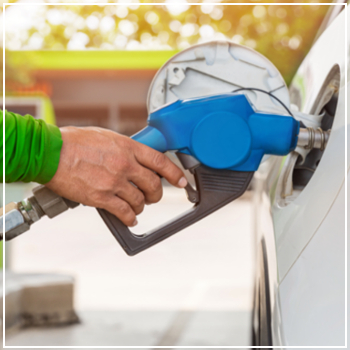Don't overlook the importance of your gas cap. A damaged or improperly sealed cap can lead to fuel evaporation, contributing to air pollution and wasting resources. If the cap feels loose or shows signs of wear, replacing it is a quick fix that could save you money in the long run. A properly sealed cap ensures your fuel stays put and helps maintain your car's efficiency. It’s common for vehicles to accumulate unnecessary items like gym bags, toolkits, or even forgotten groceries. Every extra pound in your car reduces fuel efficiency. For instance, carrying an additional 100 pounds can decrease your fuel economy by about one percent. If you frequently carry bulky items like bikes or sports equipment, consider switching to a rear-mounted carrier instead of a roof rack, which can significantly cut down on drag and improve your gas mileage. Additionally, avoid leaving heavy items like suitcases or tools in your trunk unless absolutely necessary. These extras can add up, especially if you don’t need them during your daily commute. Idling is one of the most wasteful things you can do with your car. Not only does it burn fuel unnecessarily, but it also produces more harmful emissions than when your car is moving. If you anticipate being stationary for more than a minute, turn off the engine. Modern cars restart smoothly, and the savings add up. Planning your routes to avoid areas with frequent stops or red lights can also help you reduce idling time. For example, try using apps that show real-time traffic updates to avoid congestion-prone areas. This way, you'll spend less time sitting in traffic and more time cruising smoothly. Your car’s engine performs best when it’s operating within its optimal temperature range. In colder weather, driving gently to warm up the engine can prevent excessive wear and tear. Consider using a block heater in extremely cold climates to help the engine reach operating temperature faster, improving fuel efficiency and reducing wear. In summer, parking in the shade or using a windshield sunshade can keep your car cooler, reducing reliance on the air conditioning. When you're on the road, crack the windows slightly before turning on the AC to cool the interior faster, cutting down on energy usage. The type of oil you use plays a significant role in your car's fuel efficiency. Thicker oils create more resistance, forcing the engine to work harder and consume more fuel. Opting for the manufacturer-recommended oil grade can ensure your engine runs smoothly and efficiently. Regular oil changes are equally important to keep your engine functioning optimally. Your driving style directly impacts fuel economy. Aggressive acceleration and speeding over 50 mph increase fuel consumption. Using cruise control on highways can help maintain a steady speed, reducing fuel waste. Additionally, avoid rapid starts and stops, which can lower your mileage by up to 40 percent. Other tips include using electronic toll passes to eliminate stops, avoiding downshifting in manual cars for deceleration (use the brakes instead), and mapping out routes with fewer stoplights. Keeping your foot off the brake pedal whenever possible also helps conserve fuel and prolongs the life of your braking system. Underinflated tires are a major contributor to poor fuel efficiency. For every seven pounds below recommended pressure, your fuel economy drops by up to three percent. Properly inflated tires also last longer and provide better handling. Make it a habit to check your tire pressure monthly, especially after seasonal temperature changes, which can affect inflation levels. Regular maintenance is key to keeping your car running efficiently. Worn-out spark plugs, clogged air filters, and old oil can all lead to increased fuel consumption and higher emissions. Scheduling regular tune-ups ensures your car remains in top condition. Pay attention to your vehicle's alignment, as misaligned wheels can cause the engine to work harder, increasing fuel usage and wearing down the tires unevenly. If you’ve hit a pothole or experienced slippery conditions, getting your alignment checked is a wise move. Proper alignment not only improves fuel efficiency but also extends the life of your tires and suspension components. No matter what type of service your car needs—whether it's a routine oil change, alignment adjustment, or emission testing—DaSilva’s Auto Body offers reliable, professional care. Our skilled technicians will ensure your vehicle runs smoothly and efficiently. To schedule an appointment, get in touch with our Naugatuck location today. By implementing these strategies, you can make your car more fuel-efficient without breaking the bank. Small changes can yield big results, helping you save money while reducing your environmental footprint. SHAOXING KEQIAO FANEVER IMPORT AND EXPORT CO., LTD , https://www.sxfanever.com With gas prices rising, it's natural to seek ways to boost your car's fuel efficiency. Whether you're commuting to work or planning a road trip, stretching your tank of gas further can save money and reduce trips to the pump. While upgrading to a more fuel-efficient vehicle isn't always feasible, there are several practical steps you can take to maximize your mileage.
With gas prices rising, it's natural to seek ways to boost your car's fuel efficiency. Whether you're commuting to work or planning a road trip, stretching your tank of gas further can save money and reduce trips to the pump. While upgrading to a more fuel-efficient vehicle isn't always feasible, there are several practical steps you can take to maximize your mileage.The Gas Cap Matters
Carrying Extra Weight
Minimize Idling
Engine Temperature and Driving Conditions
Choose the Right Oil
Adopt Fuel-Saving Driving Habits
Tire Pressure Matters
Maintain Your Car Regularly
Professional Maintenance Services
How to Improve Your Car’s Fuel Economy
